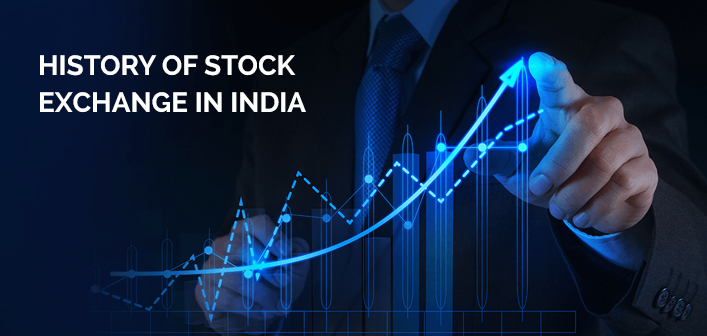Despite being an esoteric subject and limited to a few people, stock exchange has a big impact on the economy of any nation, it is actually an indicator of a country’s economical growth and performance. If you go by the definition, stock exchange is a place where shares of different public limited companies are sold and purchased. With the advent of digital technology, stock markets have become accessible to more people and they are giving a chance to every individual to deal with securities and to earn profits. And that’s why we are seeing a rise in stock market development and the adoption of digital applications are making trade easier than ever.
Table of Contents
Bombay Stock Exchange (BSE)
India happens to have the Asia’s oldest and world’s 10th largest stock exchange that was established in 1875 as Bombay Stock Exchange in the capital city of Maharashtra, Mumbai (Bombay earlier). As of April 2018, its total market capitalization exceeds $2.2 trillion and it facilitates a huge number of traders across the nation. This storied exchange was founded by Premchand Roychand who was known as Cotton King and he made huge profits in the stockbroking business. Today, the stock exchange is located at Dalal Street and we see a skyscraper in the shape of a semicircle whenever the BSE is shown on the TV or internet.
However, back in 19th century, there wasn’t much of infrastructure and trading took place under a banyan tree. Trading in the lap of nature continued for decades, it happened in front of the town hall near the Horniman Circle in the beginning and after some time, the traders moved to another banyan tree at the junction of Meadows Street. The traders’ fixation with the banyan tree hasn’t been explained anywhere, they probably chose it because it provides more shed with its humongous branches. After a few decades of conducting trade in a makeshift location, traders finally got a permanent place at Dalal Street in 1874.
In the year 1875, the traders founded “The Native Share & Stock Brokers Association” which was first of its kind. After independence, it took 10 more years for the government of India to recognize BSE as the first stock exchange of the country under the Securities Contracts Regulation Act. In the year 1986, BSE came up with an index to reckon the performance of the exchange, it was called the ‘S&P BSE Sensex’. Before the advent of electronic trading system, stock trading took place at one place where the traders gathered shouted the prices of the different stock options. In 1995, BSE adopted the electronic trading platform developed by CMC Ltd.
This platform took 50 days to be set up which, according to the experts is very short duration for screen-based trading system that had the capacity to execute 8 million orders daily. In the year 2000, BSE introduced its derivatives market using the S&P BSE SENSEX future contracts, its expansion continued in the following years. It become a partner of the United Nations Sustainable Stock Exchange initiative in 2012 and in 2016, it launched the first international exchange India that is called India INX. Today, this exchange also launches commodity derivatives contract in metals such as silver, gold, etc.
National Stock Exchange (NSE)
Established in 1992, National Stock Exchange of India became the first dematerialized electronic exchange with a fully automated screen-based trading system. As of April 2018, its market capitalization was above US$2.27 trillion and it is the 11th-largest stock exchange in the world. Its flagship index, ‘Nifty 50’ was launched in 1996 and it is used across the globe for evaluating the performance of Indian capital markets. NSE was launched with the purpose of bringing transparency in the markets, it allowed every individual with minimum experience and financial capacity to engage in trading. Earlier, trading in India was limited to a group of brokers who involved prospective traders internally without any interference of a higher authority.
NSE has helped many investors in safeguarding their shares and bonds, transferring them electronically by establishing the National Securities Depository Limited (NSDL). Besides transparency, it also brought a high degree of ease in trading, it made possible for the traders to even buy or sell a single bond or share. It reduced the bureaucratic limbo by eradicating the requirement of paper certificates that were the root cause of fraudulent transactions in the stockbroking of the country. It offered a greater level of security and brought down the prices of transactions and increased the efficacy of the whole trading mechanism. It also encouraged the SMEs and startups of India to join the trading platform with NSE EMERGE, an initiative that was focused on the growth MSMEs of the country. It enables the small and medium-sized enterprises to get listed sans launching an Initial Public Offer (IPO).
Calcutta Stock Exchange (CSE)
Established in 1908, the Calcutta Stock Exchange happens to be the second-oldest stock exchange in South Asia and the second-largest bourse in India. However, like many other regional stock exchanges, CSE has also been asked to close down its operations by the Securities and Exchange Board of India (SEBI), the matter is currently subjudice under the thrall of Calcutta High Court. The traces of trading activities date back to 1830 in Kolkata (Calcutta back then), the traders here conducted the buying and selling of British East India Company’s loan securities under a neem tree. In 1908, an official nod was given and the exchange was founded with 150 members. In 1928, a dedicated building was constructed at the Lyons Range and it was recognized by the Indian Government in 1980 under the provisions of Securities Contracts (Regulation) Act. In 1997, it switched to the electronic trading system from the open outcry platform and is still functional but with a tentative future.
Metropolitan Stock Exchange (MSE)
Metropolitan Stock Exchange offers services domestic financial institutions, private sector banks, public sector banks along with individual investors. It allows them to trade with debt market segments, interest rate futures (IRF), currency derivatives, futures and options, and capital market with an electronic platform that is recognized by the Securities and Exchange Board of India (SEBI) under the Securities Contracts (Regulation) Act and Section 2(39) of the Companies Act as well. It is located at the Bandra Kurla Complex in Mumbai, Maharashtra and was founded on 16 September 2008. MSE has its independent professional management and offers trading in ESOPs in the secondary market.
Multi Commodity Exchange (MCX)
Established in 2008, the Multi Commodity Exchange of India Ltd (MCX) is the largest and independent commodity exchange of the country. It offers trading in agricultural goods such as cotton, crude palm oil, cardamom, mentha oil, along with energy, bullion, non-ferrous metals. It was ranked the seventh largest commodity exchange in the world in terms of future contracts trade. In collaboration with Thomson Reuters, MCX launched a series of India’s first co-branded indices that involved iCOMDEX Crude Oil, iCOMDEX Copper, iCOMDEX Gold, iCOMDEX Bullion, iCOMDEX Base Metals, and iCOMDEX Composite. Its operations have been regulated by the Securities and Exchange Board of India since 28 September 2015 and it became India’s first and only exchange that got publicly listed.
National Commodity & Derivatives Exchange Limited (NCDEX)
NCDEX is an online commodity exchange that was started its operations as a public limited company on 15 December 2003. As an exchange platform dedicated for commodities and derivatives, NCDEX has 1,000 centers across the country and it makes trading possible on more than 49,000 terminals with a user-base of 20 lakh and 848 registered members.
India International Exchange (India INX)
India International Exchange is India’s first international and world’s fastest stock exchange with a turnaround time of 4 microseconds. It operates 22 hours a day, six days a week and focuses on Non-Resident Indians and international investors who could be interested in Indian markets. It was launched on 9 January 2017 and is located at the International Financial Services Centre (IFSC) GIFT City in Gujarat. The reason for its overwhelming speed of trading is the EUREX T7 platform that is highly advanced in every aspect, it handles a daily volume of US$1.5 Billion of trade effortlessly.
NSE IFSC Limited
Started on 29 November 2016, NSE IFSC Limited is a subsidiary of the National Stock Exchange of India Limited (NSE) and was founded with the aim of establishing an international exchange in the state of Gujarat. It is located at the International Financial Service Center (IFSC) in Gandhinagar which happens to be the first IFSC in the country. If offers unique benefits such as a flexible regulatory framework and competitive tax structure. When it comes to trading, you can engage with debt securities, commodity derivatives, currency derivatives, stock derivatives, and index derivatives.
Along with the operational ones, there are various regional stock exchanges that are now closed:
- Triangulum Stock Exchange (Closed in 2010)
- Mangalore Stock Exchange (Closed in 2004)
- Magadh Stock Exchange (Closed in 2007)
- Hyderabad Stock Exchange (closed in 2007)
- Coimbatore Stock Exchange
- Bhubaneshwar Stock Exchange
- Ludhiana Stock Exchange
- Inter-connected Stock Exchange of India
- Cochin Stock Exchange
- Bangalore Stock Exchange
- Vadodara Stock Exchange
- UP Stock Exchange
- Pune Stock Exchange
- OTC Exchange of India
- Madras Stock Exchange
- Madhya Pradesh Stock Exchange
- Jaipur Stock Exchange
- Guwahati Stock Exchange
- Delhi Stock Exchange
- Ahmedabad Stock Exchange
Upshot
Digitization has made stock trading easier than easier and now you have many opportunities to launch your service in this domain. Technoloader is giving you a chance to get a high-end stock trading platform that helps you establish your brand in the markets. With us, your enterprise would definitely reach the zenith sans any hurdles.


















